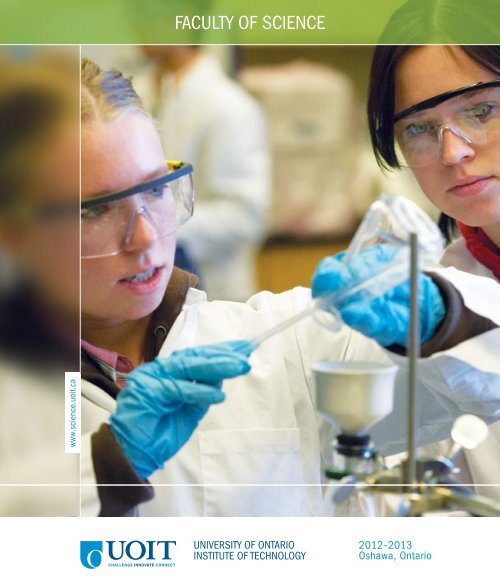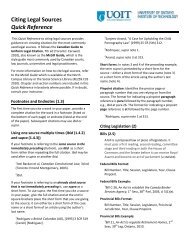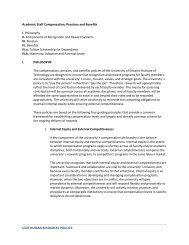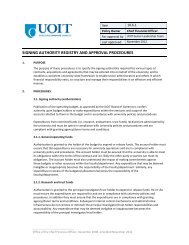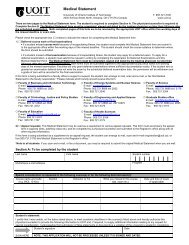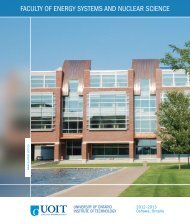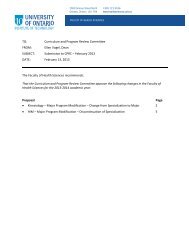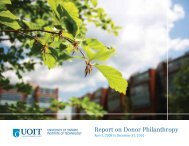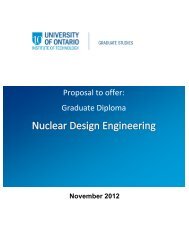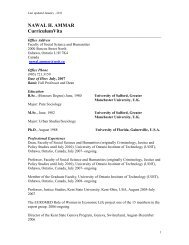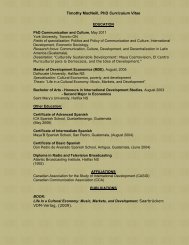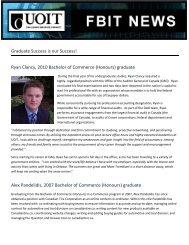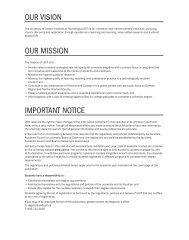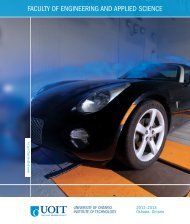FACULTY OF SCIENCE - University of Ontario Institute of Technology
FACULTY OF SCIENCE - University of Ontario Institute of Technology
FACULTY OF SCIENCE - University of Ontario Institute of Technology
Create successful ePaper yourself
Turn your PDF publications into a flip-book with our unique Google optimized e-Paper software.
<strong>FACULTY</strong> <strong>OF</strong> <strong>SCIENCE</strong><br />
www.science.uoit.ca<br />
2012–2013<br />
Oshawa, <strong>Ontario</strong>
Our<br />
mission<br />
What’s<br />
inside<br />
Our mission 3<br />
Welcome from the dean 4<br />
Faculty <strong>of</strong> Science overview 8<br />
Applied and Industrial Mathematics (regular and co-op) 10<br />
Biological Science (regular and co-op) 11<br />
Life Sciences specialization 11<br />
Pharmaceutical Biotechnology specialization 12<br />
Environmental Sustainability specialization 12<br />
Environmental Toxicology specialization 13<br />
Complementary Studies specialization 13<br />
Chemistry (regular and co-op) 14<br />
Pharmaceutical Chemistry specialization 14<br />
Biological Chemistry specialization 14<br />
Comprehensive program 15<br />
Computing Science (regular and co-op) 16<br />
Digital Media specialization 16<br />
Digital Forensics specialization 17<br />
Comprehensive program 17<br />
Forensic Science 19<br />
Physics (regular and co-op) 20<br />
Energy and the Environment specialization 20<br />
Forensic Physics specialization 21<br />
Medical Physics specialization 21<br />
Comprehensive program 21<br />
Physical Science (regular and co-op) 22<br />
Management option in Biological and Physical Science 22<br />
Bachelor <strong>of</strong> Science (Honours)/Bachelor <strong>of</strong> Education<br />
(Concurrent) 23<br />
Graduate Studies 24<br />
Hands-on experience: your competitive advantage 26<br />
Co-op programs: combine work terms with your studies 26<br />
Undergraduate research – right from your first year 28<br />
Industry connections: student research projects 29<br />
Leading-edge learning environment 30<br />
Globally experienced and award-winning faculty<br />
help broaden your knowledge 32<br />
Our faculty 34<br />
Challenge yourself outside the classroom 36<br />
Admission requirements 38<br />
How to apply 38<br />
Financing your education 39<br />
Open House events 39<br />
The Faculty <strong>of</strong> Science at UOIT is committed to excellence<br />
and innovation in technology-enhanced, interdisciplinary<br />
teaching, and research that is relevant to the needs<br />
<strong>of</strong> society and the environment. We are dedicated to<br />
creating and sharing scientific knowledge and infusing<br />
the thrill <strong>of</strong> discovery while inspiring vision, determination,<br />
independence, critical thinking and integrity in our students,<br />
thereby preparing them for rewarding careers as the next<br />
generation <strong>of</strong> highly skilled scientists and pr<strong>of</strong>essionals.<br />
2 3
For you as a student, we <strong>of</strong>fer fantastic undergraduate and<br />
graduate programs that set themselves apart by focusing on<br />
hands-on experience. These experiences are invaluable in<br />
ensuring that a degree from UOIT will provide you with the<br />
necessary tools for the career <strong>of</strong> your choice; whether that is<br />
in industry, the public sector or further studies. Our researchintensive<br />
programs reflect our commitment to technology<br />
at all levels—in our cutting edge laboratories, our wireless<br />
classrooms and campus wide facilities, and in our use <strong>of</strong><br />
technology in the classroom. We promise that your learning<br />
experience at UOIT will be top-notch, with instruction from<br />
first class researchers who will challenge you to reach your<br />
potential, whether as an undergraduate or graduate student.<br />
Welcome<br />
from the dean<br />
It is a pleasure to welcome you to the Faculty <strong>of</strong> Science at<br />
UOIT. As the new dean <strong>of</strong> Science, let me first thank our<br />
former dean, William Smith, for all he has accomplished in<br />
making our Faculty what it is today. As we move forward,<br />
we need to consider how to best achieve our commitment<br />
to our mission <strong>of</strong> “excellence and innovation in technology<br />
enhanced teaching” and to remaining “relevant to the needs<br />
<strong>of</strong> society and the environment.” As we transition to the<br />
next phase <strong>of</strong> our development, we recognize that although<br />
these are challenging goals, our committed faculty, staff and<br />
students have demonstrated they are up to the task.<br />
For undergraduate students, we <strong>of</strong>fer many ways to obtain<br />
your degree, including a four-year degree and a five-year<br />
co-operative education degree, as well as minors in each<br />
area <strong>of</strong> study. There are also enhanced programs that allow<br />
students to pursue concurrent degrees in Science and either<br />
Education or Management. For those who aspire to work<br />
in the <strong>Ontario</strong> education system, our five-year Concurrent<br />
Science/Education program allows for the combination <strong>of</strong><br />
a Bachelor <strong>of</strong> Science (honours) degree with a Bachelor<br />
<strong>of</strong> Education degree. For those whose interests lay in<br />
combining science with business, our 5-year Concurrent<br />
Science and Management program allows students to<br />
pursue training in science, complemented by relevant<br />
training in business and management. Regardless <strong>of</strong> your<br />
program, we <strong>of</strong>fer a number <strong>of</strong> opportunities for hands-on<br />
engagement, including co-op and work-study placements,<br />
as well as summer research opportunities.<br />
For graduate students, we <strong>of</strong>fer master’s and doctoral training<br />
in interdisciplinary fields, including applied bioscience,<br />
computer science, modeling and computational science and<br />
materials science (Master <strong>of</strong> Science only). As with all <strong>of</strong> our<br />
<strong>of</strong>ferings, our graduate programs focus on interdisciplinary<br />
research with real-world application(s) and the attention <strong>of</strong><br />
committed pr<strong>of</strong>essionals who are leaders in their fields.<br />
Please feel free to visit our campus; we’d be pleased to<br />
arrange for a tour <strong>of</strong> the facilities. If you have questions,<br />
please contact individual faculty members, academic<br />
advisors or myself.<br />
We look forward to meeting with you, to help plan your future<br />
path at UOIT!<br />
Regards,<br />
Physics student Raquel Murray conducts an experiment<br />
involving modelling the flight pattern <strong>of</strong> blood spatter<br />
using a high-speed camera.<br />
Dr. Deborah M. Saucier<br />
Dean, Faculty <strong>of</strong> Science<br />
4 5
Start<br />
here ><br />
Faculty <strong>of</strong> Science programs<br />
6<br />
7
Faculty <strong>of</strong> Science<br />
overview<br />
Developed in consultation with leading businesses and<br />
industry, UOIT’s innovative Science programs emphasize the<br />
skills and knowledge needed to succeed in today’s knowledgedriven<br />
economy. All programs adhere to our interdisciplinary<br />
ethos and are built on our common first-year program <strong>of</strong> study.<br />
Over the course <strong>of</strong> your career, your knowledge requirements<br />
will continuously evolve, but the scientific foundations – the<br />
analytical and problem-solving skills that form the bedrock <strong>of</strong><br />
science and our programs – will give you the tools you need to<br />
adapt to future developments in the field <strong>of</strong> any scientific path<br />
you choose to pursue.<br />
The Faculty <strong>of</strong> Science emphasizes the development<br />
<strong>of</strong> leadership and communication skills. Writing grant<br />
proposals, competing for additional funding whether in<br />
academia or industry, managing a research lab or running<br />
a research and development department are all important<br />
aspects <strong>of</strong> a successful and fulfilling scientific career. You<br />
will participate in team projects, frequently focused on<br />
controversial and complex issues, and learn to communicate<br />
clearly and concisely in written, graphical and oral formats<br />
for a variety <strong>of</strong> audiences. We maintain strong links with<br />
other faculties <strong>of</strong> the university, in particular with the<br />
faculties <strong>of</strong> Business and Information <strong>Technology</strong>; Education;<br />
Engineering and Applied Science; and Health Sciences,<br />
providing further educational opportunities for students and<br />
for research collaboration.<br />
“UOIT’s chemistry program provided me with the<br />
knowledge and background that I needed to be<br />
accepted into the Bachelor <strong>of</strong> Pharmacy programs<br />
at the <strong>University</strong> <strong>of</strong> Toronto and the <strong>University</strong> <strong>of</strong><br />
Waterloo. UOIT’s strong emphasis on individual student<br />
success, with pr<strong>of</strong>essors, staff and administrators who<br />
are always willing to help, provided me with the tools<br />
and support I needed to succeed.”<br />
– Anthony Vo, Chemistry, class <strong>of</strong> 2012<br />
INTERDISCIPLINARITY AS<br />
A CORE ELEMENT <strong>OF</strong> ALL<br />
<strong>SCIENCE</strong> PROGRAMS<br />
From finding a cure for cancer to developing new ways<br />
to produce and conserve energy, many <strong>of</strong> society’s most<br />
important and difficult technological problems require<br />
knowledge <strong>of</strong> more than one traditional discipline. This<br />
philosophy is embedded in all Science programs, from<br />
the common first-year set <strong>of</strong> courses to the integration<br />
<strong>of</strong> courses from several disciplines within programs. Our<br />
Forensic Science program is perhaps the foremost example,<br />
which integrates courses in biology and chemistry with<br />
courses related to legal law and crime scene science.<br />
THE COMMON FOUNDATION:<br />
UOIT’S COMPREHENSIVE<br />
FIRST-YEAR <strong>SCIENCE</strong><br />
PROGRAM<br />
All Science programs entail deep knowledge in the core<br />
discipline, preparing you for further studies, including<br />
graduate school. You begin your university career with a<br />
common program <strong>of</strong> study in Biology, Physics, Chemistry and<br />
Calculus, which gives you a powerful understanding <strong>of</strong> the<br />
basis <strong>of</strong> life, the basic governing principles <strong>of</strong> the universe,<br />
the reactions and transformations <strong>of</strong> matter and the<br />
mathematical language used to describe the universe.<br />
This introductory year prepares you for changes in your<br />
future career, as new knowledge evolves and scientific<br />
knowledge is integrated from multiple disciplines. It also<br />
creates flexibility in allowing you to change programs after<br />
first year with no delay in your studies.<br />
PROGRAM SPECIALIZATIONS:<br />
BASIC <strong>SCIENCE</strong> AND ITS<br />
RELEVANCE TO THE REAL<br />
WORLD<br />
Most <strong>of</strong> our programs allow you to pursue a specialization –<br />
a collection <strong>of</strong> courses emphasizing an application area <strong>of</strong> a<br />
discipline, each oriented towards an important and relevant<br />
real-world theme, such as digital media (Computing Science),<br />
energy and the environment (Physics), environmental toxicology<br />
(Biological Science) and pharmaceutical chemistry (Chemistry).<br />
Within most disciplines, students also have the option to<br />
pursue a broad comprehensive specialization. Here, they<br />
have the ability to combine elective Science courses with<br />
their core program requirements, in consultation with their<br />
pr<strong>of</strong>essors and academic advisor.<br />
MINOR PROGRAMS<br />
A minor is a set <strong>of</strong> courses in an area <strong>of</strong> study providing both<br />
basic knowledge and some breadth. In addition to one <strong>of</strong> the<br />
primary programs <strong>of</strong> study in Biology, Physics, Chemistry and<br />
Calculus, you can also pursue a minor in Biology, Chemistry,<br />
Physics or Mathematics, or in the interdisciplinary area <strong>of</strong><br />
Computational Science. Your academic advisor can help you<br />
choose a suitable set <strong>of</strong> courses for your minor.<br />
FAST FACT<br />
The Faculty <strong>of</strong> Science also <strong>of</strong>fers leading-edge<br />
interdisciplinary master’s and doctoral programs in Applied<br />
Bioscience, Computer Science, Materials Science, and<br />
Modelling and Computational Science.<br />
8 9
Applied and<br />
Industrial<br />
Mathematics<br />
(regular and co-op)<br />
Integral to every aspect <strong>of</strong> scientific endeavour, mathematics<br />
is fundamental to problem solving – whether modelling<br />
atmospheric phenomena, managing the complexities <strong>of</strong> risk in<br />
financial markets or being applied in cryptography and medical<br />
imaging. Students in the Applied and Industrial Mathematics<br />
program learn concepts, principles, qualitative and quantitative<br />
methods and innovative problem-solving skills. You work with<br />
state-<strong>of</strong>-the-art algorithms and s<strong>of</strong>tware and learn and apply<br />
advanced numerical skills. Applications include statistical<br />
analysis <strong>of</strong> data, modelling physical or biological phenomena<br />
and implementing computer algorithms.<br />
After the first year, your studies include:<br />
• Applied Functional<br />
Analysis;<br />
• Complex Analysis;<br />
• Computational Science;<br />
• Differential Equations;<br />
• Dynamic Systems and<br />
Chaos;<br />
• Industrial Mathematics;<br />
• Mathematical Modelling; and<br />
• Optimization.<br />
Careers and post-graduate study opportunities include:<br />
• Communications<br />
technology;<br />
• Computer s<strong>of</strong>tware<br />
(systems analyst or<br />
cryptography);<br />
• Consulting;<br />
• Financial services (banking<br />
and financial sector);<br />
• Government agencies<br />
(Statistics Canada,<br />
Department <strong>of</strong> Defence);<br />
• High school teacher<br />
(through UOIT’s Concurrent<br />
or Consecutive Education<br />
program);<br />
• Insurance (actuary or<br />
analyst);<br />
• Law school;<br />
• Manufacturing; and<br />
• Medical school.<br />
“UOIT’s comprehensive undergraduate programs<br />
in applied mathematics and physics have provided<br />
me with a wealth <strong>of</strong> knowledge and a broad set <strong>of</strong><br />
computational techniques that allowed me to thrive<br />
in my current studies at the <strong>University</strong> <strong>of</strong> Oxford.<br />
Moreover, the laptop-centric curricula <strong>of</strong> these<br />
programs enabled me to become familiar with a range<br />
<strong>of</strong> mathematical s<strong>of</strong>tware that I now use regularly in<br />
order to perform real-world calculations, which are<br />
much too difficult, or even impossible, to be carried<br />
out by hand. UOIT strongly emphasizes undergraduate<br />
research and this opportunity, under the supervision<br />
<strong>of</strong> a faculty member, was undoubtedly one <strong>of</strong> the<br />
highlights <strong>of</strong> my undergraduate education. It allowed<br />
me to develop essential research skills and also meet<br />
and collaborate with other students and faculty from<br />
around the world.”<br />
– Matthew Hennessey, Mathematics and Physics, class <strong>of</strong><br />
2009; winner <strong>of</strong> an Oxford <strong>University</strong> scholarship in the<br />
Master <strong>of</strong> Science in Mathematical Modelling and Scientific<br />
Computing program<br />
Biological<br />
Science<br />
(regular and co-op)<br />
Biological Science is the study <strong>of</strong> life at its most fundamental<br />
level. The foundational areas <strong>of</strong> cell biology, genetics and<br />
molecular biology, physiology, biochemistry and developmental<br />
biology are mastered in the Biological Science program. As you<br />
proceed through the program, you have access to specialized<br />
courses such as Bioethics, Neuroscience, Functional Genomics<br />
and Proteomics. Graduates are in high demand in diverse<br />
sectors including biotechnology, the environment, consulting<br />
and government. Specializations have common courses during<br />
their first two years, allowing for flexibility and transfer.<br />
In addition to the common first year, the common upper-year<br />
courses in all Biological Science programs are:<br />
• Biochemistry;<br />
• Bioethics;<br />
• Cell Biology;<br />
• Developmental Biology;<br />
• Biology Thesis Project I<br />
and II;<br />
• Genetics and Molecular<br />
Biology;<br />
• Introduction to Organic<br />
Chemistry;<br />
• Introductory Physiology;<br />
• Microbiology and<br />
Immunology; and<br />
• Statistics and Probability<br />
for Biological Science.<br />
Careers and post-graduate study opportunities<br />
include the following areas:<br />
• Consulting;<br />
• Food industry;<br />
• Governmental or private<br />
research laboratory;<br />
• High school teaching<br />
(through UOIT’s Concurrent<br />
or Consecutive Education<br />
program);<br />
• Marketing (biotechnology<br />
or publishing industry); and<br />
• Medical school.<br />
“UOIT exposed me to a variety <strong>of</strong> academic and<br />
non-academic experiences that I feel allowed me to<br />
produce a strong application for medical schools in<br />
<strong>Ontario</strong>. The pr<strong>of</strong>essors, teaching assistants, staff<br />
and administrators all have the best interests <strong>of</strong> each<br />
individual student in mind and are always willing to<br />
help. Small class sizes, access to instructors, a strong<br />
student community and the family atmosphere present<br />
at UOIT made me feel like it was my second home and<br />
motivated me to excel during my time on campus.”<br />
– Naheed Dosani, Biological Science, class <strong>of</strong> 2008; medical<br />
school student at McMaster <strong>University</strong><br />
LIFE <strong>SCIENCE</strong>S SPECIALIZATION<br />
This specialization is well-suited if you are interested in<br />
medical school and related medical and health science<br />
careers. The emphasis is on human aspects <strong>of</strong> biology,<br />
providing an integrated grounding in the life sciences with<br />
a particular focus on biology and chemistry and additional<br />
course work in neuroscience and human anatomy. You<br />
have priority access to all required courses at UOIT in this<br />
program, in preference to students in other programs taking<br />
the courses as electives.<br />
By means <strong>of</strong> its broad science foundation and its human<br />
biology focus, this program provides an excellent basis for<br />
writing the MCAT examinations and for satisfying course<br />
requirements for applying to medical school. A description<br />
<strong>of</strong> the current entrance requirements for <strong>Ontario</strong>’s medical<br />
schools can be found at http://www.ouac.on.ca/omsas/.<br />
Courses in the upper years <strong>of</strong> the Life Sciences<br />
specialization include:<br />
• Advanced Biochemistry;<br />
• Advanced Topics<br />
in Pharmaceutical<br />
Biotechnology;<br />
• Fundamentals <strong>of</strong><br />
Neuroscience;<br />
• Fundamentals <strong>of</strong> Nutrition;<br />
• Human Anatomy;<br />
• Organic Chemistry;<br />
• Physiology <strong>of</strong> Regulatory<br />
Systems; and<br />
• Principles <strong>of</strong> Pharmacology<br />
and Toxicology.<br />
Careers and post-graduate study opportunities include:<br />
• Medical school; and<br />
• Post-degree health-related programs such as Physiotherapy.<br />
10 11
PHARMACEUTICAL<br />
BIOTECHNOLOGY<br />
SPECIALIZATION<br />
Biotechnology is a rapidly growing area with many<br />
applications in health, agriculture and industry. The<br />
Pharmaceutical Biotechnology specialization combines a<br />
primary emphasis on biology and chemistry with molecular<br />
and cell biology, and microbiology. You will build a strong<br />
understanding <strong>of</strong> cell and molecular biology, microbiology,<br />
immunology, biochemistry and physiology.<br />
Courses in the upper years <strong>of</strong> the Pharmaceutical<br />
Biotechnology specialization include:<br />
• Advanced Biochemistry;<br />
• Advanced Topics<br />
in Pharmaceutical<br />
Biotechnology;<br />
• Analytical Chemistry for<br />
Biosciences;<br />
• Applied Molecular Biology;<br />
• Functional Genomics and<br />
Proteomics;<br />
• Instrumental Analytical<br />
Chemistry;<br />
• Laboratory Methods in<br />
Molecular Biology;<br />
• Physiology <strong>of</strong> Regulatory<br />
Systems; and<br />
• Principles <strong>of</strong> Pharmacology<br />
and Toxicology.<br />
Students will find careers and post-graduate study<br />
opportunities in the pharmaceutical area.<br />
ENVIRONMENTAL<br />
SUSTAINABILITY<br />
SPECIALIZATION<br />
Starting in the 2012-2013 academic year, the Faculty <strong>of</strong><br />
Science will be <strong>of</strong>fering a new specialization in Biological<br />
Science called Environmental Sustainability Science (ESS).<br />
While many universities have Environmental Science programs<br />
that typically <strong>of</strong>fer a broad range <strong>of</strong> courses from all the<br />
natural science disciplines, specializations in Environmental<br />
Sustainability tend to be mainly social science based (e.g.,<br />
geography, policy studies). The ESS program at UOIT is unique<br />
in that it is the first <strong>of</strong> its kind to have a strong biological<br />
science focus, from genomes to ecosystems. The integrated<br />
approach <strong>of</strong> the ESS specialization exposes students to a<br />
variety <strong>of</strong> science disciplines, providing them with the scientific<br />
basis necessary for understanding the physical, chemical and<br />
biological behaviour <strong>of</strong> the Earth’s ecosystems.<br />
The sustainability theme inherent in the program<br />
provides a framework for the analysis <strong>of</strong> the human<br />
impacts on the environment, as well as an introduction<br />
to the socioeconomic, political, technological and cultural<br />
influences that govern choices we make about the<br />
environment. The ESS program <strong>of</strong>fers an integrated set<br />
<strong>of</strong> courses that provide scientific understanding with the<br />
underlying principles <strong>of</strong> sustainability. Students have<br />
access to modern laboratories, computational tools and<br />
sophisticated equipment with state-<strong>of</strong>-the-art facilities.<br />
Courses in the upper years <strong>of</strong> the Environmental<br />
Sustainability specialization include:<br />
• Analytical Chemistry for<br />
Biosciences;<br />
• Aquatic Ecology;<br />
• Bioethics;<br />
• Biostatistics;<br />
• Conservation Biology;<br />
• Ecology;<br />
• Ecosystem Science;<br />
• Environmental<br />
Biotechnology;<br />
• Environmental Chemistry;<br />
• Environmental Risk<br />
Characterization;<br />
• Instrumental Analytical<br />
Chemistry;<br />
• Introduction to<br />
Environmental Research<br />
Methods;<br />
• Plant Biology; and<br />
• Principles <strong>of</strong> Pharmacology<br />
and Toxicology.<br />
Jobs in the environmental sector, also referred to as green<br />
jobs, are believed to be an important area <strong>of</strong> growth and<br />
demand for highly skilled and trained personnel. Careers and<br />
post-graduate study opportunities include the following areas:<br />
• Alternative fuels industry;<br />
• Environmental compliance;<br />
• Environmental/energy<br />
consulting and policy<br />
development;<br />
• Natural resource<br />
management;<br />
• Non-governmental<br />
organizations (NGOs); and<br />
• Sustainability/<br />
environmental initiatives<br />
and regulation.<br />
The broad skills base acquired through the ESS program<br />
will permit a variety <strong>of</strong> complementary career paths in<br />
business administration, urban affairs, regional planning,<br />
communications studies (such as environmental journalism),<br />
environmental design, law and education.<br />
ENVIRONMENTAL<br />
TOXICOLOGY SPECIALIZATION<br />
Environmental toxicology is an interdisciplinary applied<br />
field involving health, agriculture, urban development and<br />
industry. It combines a strong base in biology and chemistry,<br />
with a focus on physiology, biochemistry, environmental<br />
science and environmental chemistry.<br />
Courses in the upper years <strong>of</strong> this specialization include:<br />
• Advanced Topics in<br />
Environmental Toxicology;<br />
• Analytical Chemistry for<br />
Biosciences;<br />
• Biostatistics;<br />
• Environmental Chemistry;<br />
• Environmental Risk<br />
Characterization;<br />
• Instrumental Analytical<br />
Chemistry;<br />
• Introduction to<br />
Environmental Research<br />
Methods; and<br />
• Principles <strong>of</strong> Pharmacology<br />
and Toxicology.<br />
Students will find careers and post-graduate study<br />
opportunities in the environmental area.<br />
COMPLEMENTARY STUDIES<br />
SPECIALIZATION<br />
This specialization provides broad coverage <strong>of</strong> fundamental<br />
topics in biology. It can be customized to your particular<br />
interests and career goals. Consult your academic advisor for<br />
assistance and approval when building your program map.<br />
Management option in Biological and Physical Science<br />
(regular and co-op) (five-year program)*<br />
*Please refer to Physical Science section on page 22<br />
for full details.<br />
“I strongly believe that an undergraduate education at<br />
UOIT has not only provided me with a strong work ethic<br />
but has prepared me in a practical sense for a future<br />
career in medicine. Medicine is becoming increasingly<br />
collaborative – I strongly feel that UOIT reflects this<br />
ideal, encouraging interaction between students,<br />
helpful and passionate pr<strong>of</strong>essors, and hard-working<br />
faculty members. Finally, the integration <strong>of</strong> technology<br />
in the field <strong>of</strong> medicine is becoming quite common; as<br />
a laptop-based university, UOIT has inspired me to<br />
integrate technology as a useful learning tool in my<br />
future studies.”<br />
– Shaqil Peermohamed, Biological Science, class <strong>of</strong> 2008;<br />
medical school student at the <strong>University</strong> <strong>of</strong> Calgary.<br />
12 13
Chemistry<br />
(regular and co-op)<br />
Chemistry, the central science, is the study <strong>of</strong> elements<br />
and compounds, their properties and the ways they react to<br />
form new substances. From the practical to the theoretical,<br />
UOIT exposes you to all major fields <strong>of</strong> chemistry: physical,<br />
analytical, organic, inorganic and biochemistry. You can<br />
follow the comprehensive program or choose to specialize<br />
in either Pharmaceutical Chemistry or Biological Chemistry<br />
(courses are accepted by the Pharmacy programs at the<br />
<strong>University</strong> <strong>of</strong> Toronto and the <strong>University</strong> <strong>of</strong> Waterloo).<br />
Courses common to all Chemistry specializations beyond the<br />
first year are:<br />
• Advanced Organic<br />
Chemistry;<br />
• Analytical Chemistry;<br />
• Biochemistry;<br />
• Chemistry Thesis Project I<br />
and II;<br />
• Fundamentals <strong>of</strong> Physical<br />
Chemistry;<br />
• Inorganic Chemistry I and II;<br />
• Instrumental Analytical<br />
Chemistry I and II;<br />
• Introduction to Organic<br />
Chemistry;<br />
• Organic Chemistry;<br />
• Physical Chemistry;<br />
• Statistics and Probability<br />
for Physical Science;<br />
• Structure and Bonding;<br />
• Structure Determination <strong>of</strong><br />
Organic Molecules; and<br />
• Thermodynamics and<br />
Kinetics.<br />
Careers and post-graduate study opportunities<br />
include:<br />
• Chemical processing;<br />
• Consulting;<br />
• Environmental sector;<br />
• Government research<br />
laboratories;<br />
• Graduate and other<br />
post-degree studies<br />
(medical school, pharmacy<br />
or dentistry);<br />
• High school teacher<br />
(through UOIT’s Concurrent<br />
or Consecutive Education<br />
program); and<br />
• Marketing (chemical or<br />
publishing industry).<br />
PHARMACEUTICAL CHEMISTRY<br />
SPECIALIZATION<br />
This specialization provides an integrated base in chemical<br />
science fundamental to the pharmaceutical industry.<br />
Courses in the upper years <strong>of</strong> the Pharmaceutical Chemistry<br />
specialization include:<br />
• Advanced Biochemistry;<br />
• Advanced Topics<br />
in Pharmaceutical<br />
Biotechnology;<br />
• Advanced Topics in<br />
Pharmaceutical Chemistry;<br />
• Introductory Physiology;<br />
• Pharmaceutical Discovery;<br />
• Principles <strong>of</strong> Pharmacology<br />
and Toxicology; and<br />
• Structure Determination <strong>of</strong><br />
Organic Molecules.<br />
Students will find careers and post-graduate study<br />
opportunities in the pharmaceutical industry.<br />
BIOLOGICAL CHEMISTRY<br />
SPECIALIZATION<br />
This specialization provides an orientation towards biological<br />
processes at the molecular level.<br />
Courses in the upper years <strong>of</strong> the Biological Chemistry<br />
specialization include:<br />
• Advanced Biochemistry;<br />
• Advanced Topics in<br />
Biological Chemistry;<br />
• Bio-organic Chemistry;<br />
• Cell Biology;<br />
• Genetics and Molecular<br />
Biology; and<br />
• Laboratory Methods in<br />
Molecular Biology.<br />
Career opportunities and post-graduate studies<br />
include:<br />
• Biotechnology sector; and<br />
• Food industry.<br />
COMPREHENSIVE PROGRAM<br />
The comprehensive program provides broad coverage <strong>of</strong><br />
fundamental topics in Chemistry. In addition to the courses<br />
common to all specializations, it includes distinctive courses in:<br />
• Environmental Chemistry;<br />
• Industrial Chemistry; and<br />
• Molecular Spectroscopy.<br />
“After completing a Science degree in Chemistry at<br />
UOIT in 2007, I was accepted into medical school at<br />
the <strong>University</strong> <strong>of</strong> Toronto. UOIT gave me a broad set<br />
<strong>of</strong> skills across the sciences, which helped me succeed<br />
in the MCAT exam. The research experience I gained<br />
during my undergraduate program at UOIT has proven<br />
to be highly valuable at medical school since there<br />
is a large research component to the program. Many<br />
<strong>of</strong> my colleagues pursued graduate degrees before<br />
entering medical school, but I felt well-equipped with<br />
the essential research skills I developed under the<br />
supervision <strong>of</strong> my Chemistry pr<strong>of</strong>essor.”<br />
– Katey Jakins, Chemistry, class <strong>of</strong> 2007; medical school<br />
student at the <strong>University</strong> <strong>of</strong> Toronto<br />
14 15
Computing<br />
Science<br />
(regular and co-op)<br />
Computing science is the study <strong>of</strong> the theoretical foundations<br />
<strong>of</strong> information and computation and their implementation<br />
and application in computer systems. Our program explores<br />
concepts, principles, qualitative and quantitative methods,<br />
innovative problem-solving skills and practical applications.<br />
Graduates understand the principles <strong>of</strong> information technology<br />
and communications relevant to science and related fields<br />
using computer-based tools to access information and are<br />
prepared to adapt easily to new technologies. You can choose<br />
to follow the Digital Media or Digital Forensics specialization, or<br />
the comprehensive program.<br />
Courses common to all Computing Science programs beyond<br />
first-year level are:<br />
• Analysis and Design <strong>of</strong><br />
Algorithms;<br />
• Compilers;<br />
• Operating Systems;<br />
• Principles <strong>of</strong> Computer<br />
Science;<br />
DIGITAL MEDIA<br />
SPECIALIZATION<br />
Interactive computer applications such as sound, images,<br />
graphics and video are an area <strong>of</strong> explosive growth in<br />
computing science. Entertainment, media, education,<br />
advertising and telecommunications are being pr<strong>of</strong>oundly<br />
impacted as computer games, educational s<strong>of</strong>tware, mobile<br />
devices, marketing, advertising and location-based services<br />
become pervasive and replace traditional media. Designed<br />
to complement the existing Game Development and<br />
Entrepreneurship program in UOIT’s Faculty <strong>of</strong> Business and<br />
Information <strong>Technology</strong>, this program explicitly addresses the<br />
underlying technologies used in game development and other<br />
forms <strong>of</strong> digital media through the science that informs it.<br />
Courses in the Digital Media specialization include:<br />
• Advanced Computer<br />
Graphics;<br />
• Digital Media;<br />
• Interactive Media;<br />
• Mobile Devices;<br />
• S<strong>of</strong>tware Engineering; and<br />
• System Analysis and<br />
Design in Applications.<br />
Students will find careers and post-graduate study<br />
opportunities in the digital media sector.<br />
DIGITAL FORENSICS<br />
SPECIALIZATION<br />
As computers infiltrate every aspect <strong>of</strong> public and private life,<br />
there is a corresponding need for workers who understand<br />
computers and digital technology as repositories <strong>of</strong> evidence.<br />
UOIT is one <strong>of</strong> the few academic institutions in the world<br />
that <strong>of</strong>fers an undergraduate program that addresses<br />
the complex issue <strong>of</strong> digital forensics. Based on a core<br />
Computing Science program, it includes a selection <strong>of</strong><br />
specialized courses that provide both an introduction to<br />
forensic science principles and applications <strong>of</strong> computer<br />
science in this area.<br />
UOIT is the only Canadian university to <strong>of</strong>fer a Digital<br />
Forensics specialization within a full Bachelor <strong>of</strong> Science<br />
(Honours) Computing Science program. Courses in the<br />
Digital Forensics specialization include:<br />
• Advanced Topics in<br />
Forensic Science;<br />
• Crime Scene Science;<br />
• Criminalistics;<br />
• Digital Evidence;<br />
• Forensic Informatics;<br />
• Introduction to Forensic<br />
Science; and<br />
• Law for Forensic Scientists.<br />
COMPREHENSIVE PROGRAM<br />
The comprehensive program provides broad coverage <strong>of</strong><br />
fundamental topics in Computing Science. In addition to the<br />
common set <strong>of</strong> courses for all Computing Science programs,<br />
the comprehensive program contains the following courses:<br />
• S<strong>of</strong>tware Engineering; and<br />
• System Analysis and Design in Applications.<br />
“The research opportunities I had while doing my<br />
degree gave me an advantage while applying to<br />
graduate school. Upon graduating from UOIT, I started<br />
my Master’s degree at the <strong>University</strong> <strong>of</strong> Toronto along<br />
with a Natural Sciences and Engineering Research<br />
Council <strong>of</strong> Canada (NSERC) scholarship. My UOIT<br />
research experience has been invaluable in kickstarting<br />
my academic career.”<br />
– Michael Mior, Computing Science, class <strong>of</strong> 2009; Computer<br />
Science graduate student at the <strong>University</strong> <strong>of</strong> Toronto<br />
• Computational Science I;<br />
• Computer Architecture I<br />
and II;<br />
• Scientific Visualization and<br />
Computer Graphics;<br />
• Simulation and Modelling;<br />
Students will find careers and post-graduate study<br />
opportunities in forensics.<br />
• Computer Networks;<br />
• Database Systems and<br />
Concepts;<br />
• Discrete Structures in<br />
Computer Science;<br />
• S<strong>of</strong>tware Systems<br />
Development and<br />
Integration; and<br />
• Statistics and Probability<br />
for Physical Science.<br />
• Ethics, Law and the Social<br />
Impact <strong>of</strong> Computing;<br />
Careers and post-graduate studies include:<br />
• Computer consultancy;<br />
• Computer programming;<br />
• Graduate studies (such as<br />
Computing Science);<br />
• High school teaching<br />
(through UOIT’s<br />
Consecutive Education<br />
program);<br />
• Information technology;<br />
• Marketing (publishing<br />
industry);<br />
• S<strong>of</strong>tware engineering;<br />
• Systems analysis; and<br />
• Technical support analysis.<br />
16 17
Forensic<br />
Science<br />
Forensic science is an emerging interdisciplinary area<br />
drawing strongly upon social science to apply scientific<br />
principles to the analysis <strong>of</strong> evidence for legal investigations.<br />
UOIT’s Forensic Science program is distinguished by a strong<br />
scientific foundation in biology and chemistry. It contains<br />
sufficient biology content to proceed to graduate school in<br />
biological science and most <strong>of</strong> the chemistry requirements<br />
in that area. Your electives deepen your knowledge <strong>of</strong> either<br />
chemistry or biology, opening up additional career options.<br />
Due to the laboratory intensive nature <strong>of</strong> the Forensic<br />
Science program, UOIT can only accept a limited number<br />
<strong>of</strong> students and you are required to maintain a minimum<br />
cumulative grade point average (GPA) <strong>of</strong> 2.0 to continue in<br />
the program. Work placement opportunities are available in<br />
the upper years <strong>of</strong> the program.<br />
The Forensic Science program at UOIT is enhanced by<br />
the existence <strong>of</strong> the Crime Scene House adjacent to the<br />
university’s north Oshawa location, which is outfitted with<br />
mock crime scenes and provides a laboratory setting for<br />
some <strong>of</strong> the courses in the program. UOIT was the first<br />
university in the province to create such a facility.<br />
In the upper years <strong>of</strong> the program, students are equipped with<br />
tablet computers. In addition to using them in all their courses,<br />
particular use is made <strong>of</strong> them at the Crime Scene House. For<br />
example, crime scene evidence can be conveniently collected<br />
in the field and transmitted wirelessly to computers elsewhere<br />
and portable USB-connected microscopes provide an enhanced<br />
evidence collection mechanism.<br />
In addition to courses common to all first-year Science<br />
programs, the Forensic Science program includes the<br />
following courses:<br />
• Advanced Topics in<br />
Forensic Science;<br />
• Analytical Chemistry;<br />
• Biochemistry;<br />
• Cell Biology;<br />
• Crime Scene Science;<br />
• Criminalistics;<br />
• Drug Chemistry and<br />
Toxicology;<br />
• Genetics and Molecular<br />
Biology;<br />
• Human Anatomy;<br />
• Introductory Physiology;<br />
• Introductory Psychology;<br />
• Law for Forensic Scientists;<br />
• Organic Chemistry;<br />
• Physical Chemistry for<br />
Biosciences; and<br />
• Principles <strong>of</strong> Pharmacology<br />
and Toxicology.<br />
Careers and post-graduate studies include:<br />
• Consulting;<br />
• Forensic science;<br />
• Government agencies<br />
(customs and immigration<br />
or document examination);<br />
• Graduate or other<br />
post-degree studies (law<br />
school, medical school,<br />
pharmacy, dentistry or<br />
physiotherapy);<br />
• High school teaching<br />
(through UOIT’s<br />
Consecutive Education<br />
program);<br />
• Insurance company claims<br />
investigation;<br />
• Marketing (publishing<br />
industry); and<br />
• Police agencies (after<br />
required training).<br />
UOIT has a Forensic Science Program Advisory Board, which<br />
consists <strong>of</strong> prominent members <strong>of</strong> the forensic community.<br />
The program has frequent guest speakers, including<br />
representatives from the <strong>Ontario</strong> Centre <strong>of</strong> Forensic Sciences,<br />
the <strong>Ontario</strong> Coroner’s Office and several police forces.<br />
18<br />
19
Physics<br />
(regular and co-op)<br />
Physics is the science <strong>of</strong> nature. Force, motion, light, sound,<br />
electricity, magnetism and the structure <strong>of</strong> matter all lay at<br />
the heart <strong>of</strong> natural sciences and technology. You benefit from<br />
exposure to the cutting-edge research interests <strong>of</strong> faculty<br />
members in renewable energy, semiconductor devices,<br />
microelectronics, materials science and computational<br />
physics. You can also choose to specialize in Energy and the<br />
Environment, Forensic Physics, Medical Physics or pursue the<br />
comprehensive program.<br />
Courses common to all Physics programs include the<br />
following:<br />
• Differential Equations;<br />
• Electronics;<br />
• Electricity and Magnetism<br />
I and II;<br />
• Fluid Mechanics;<br />
• Linear Algebra;<br />
• Mechanics I;<br />
• Physics Thesis Project I<br />
and II;<br />
• Quantum Mechanics I;<br />
• Statistical Mechanics I;<br />
• Statistics and Probability<br />
for Physical Science;<br />
• Thermodynamics and Heat<br />
Transfer; and<br />
• Waves and Optics.<br />
Careers and post-graduate studies include:<br />
• Consulting;<br />
• Graduate studies<br />
(traditional physics,<br />
medical physics or<br />
related fields);<br />
• Government agencies<br />
(research laboratory or<br />
Department <strong>of</strong> National<br />
Defence);<br />
• High school teacher<br />
(through UOIT’s Concurrent<br />
or Consecutive Education<br />
program);<br />
• Marketing (publishing<br />
industry); and<br />
• Post-degree studies<br />
(law school, pharmacy<br />
or dentistry).<br />
ENERGY AND THE<br />
ENVIRONMENT<br />
SPECIALIZATION<br />
Unique in Canada, this specialization in physics is designed<br />
to meet the urgent demand for graduates with the<br />
knowledge and skills to address global issues <strong>of</strong> escalating<br />
energy consumption and declining resources. It emphasizes<br />
expertise in alternative and conventional energy and the<br />
scientific principles underlying the development <strong>of</strong> novel and<br />
economical means <strong>of</strong> generating and harvesting energy,<br />
while simultaneously minimizing their environmental impact.<br />
In addition to the core Physics courses common to all<br />
specializations, courses in the Energy and the Environment<br />
specialization include:<br />
• Earth-based Energy<br />
Systems;<br />
• Economics and Politics <strong>of</strong><br />
the Environment;<br />
• Hydrogen-based Energy<br />
Systems and Fuel Cells;<br />
• Introductory Energy Science;<br />
• Introductory Environment<br />
Science;<br />
• Nuclear Physics and<br />
Relativity; and<br />
• Solar Energy and<br />
Photovoltaics.<br />
Careers and post-graduate studies include:<br />
• Energy specialist; and<br />
• Energy supply industry.<br />
FORENSIC PHYSICS<br />
SPECIALIZATION<br />
Physics plays a key role in many aspects <strong>of</strong> forensic analysis,<br />
including the ballistics <strong>of</strong> bullets and other projectiles,<br />
vehicle collisions, the physics <strong>of</strong> explosions and bloodstain<br />
patterns. This specialization enhances a basic Physics<br />
program with an introduction to the physics underlying these<br />
areas. UOIT was the first university in Canada to <strong>of</strong>fer a<br />
Forensic Physics specialization based on a full BSc (Honours)<br />
Physics program.<br />
In addition to the core Physics courses common to<br />
all specializations, courses in the Forensic Physics<br />
specialization include:<br />
• Advanced Topics in<br />
Forensic Science;<br />
• Crime Scene Science;<br />
• Criminalistics;<br />
• Forensic Physics;<br />
• Introduction to Forensic<br />
Science; and<br />
• Law for Forensic Scientists.<br />
Students will find careers and post-graduate study<br />
opportunities in the various fields <strong>of</strong> forensic physics.<br />
MEDICAL PHYSICS<br />
SPECIALIZATION<br />
Medical physics is a growing and important field, which<br />
applies physics-based principles to the diagnosis, treatment<br />
and monitoring <strong>of</strong> diseases through the use <strong>of</strong> modern<br />
techniques such as magnetic resonance imaging (MRI)<br />
scanning, computerized tomography (CT) scanning, X-ray,<br />
ultrasound and laser surgery. Primary areas <strong>of</strong> application<br />
are cancer treatment (ionizing radiation), brain and heart<br />
disorders (bioelectric and biomagnetic investigations) and<br />
radiation hazards and protection. The Medical Physics<br />
specialization in the BSc (Honours) Physics program provides<br />
graduates with core skills in physics and related mathematics.<br />
The university is linked to the Lakeridge Health Education and<br />
Research Network through the UOIT Education Partnership,<br />
thereby providing the necessary environment for practical<br />
experience with medical problems and equipment.<br />
In addition to the core Physics courses common to all<br />
specializations, courses in the Medical Physics specialization<br />
include:<br />
• Cell and Molecular Biology;<br />
• Health Physics Laboratory;<br />
• Medical Applications <strong>of</strong><br />
Radiation Techniques;<br />
• Medical Imaging;<br />
• Nuclear Physics and<br />
Relativity;<br />
Careers and post-graduate studies include:<br />
• Biophysics;<br />
• Health-care technology,<br />
including radiation<br />
therapy, medical imaging<br />
technologies or cancer<br />
clinics;<br />
• Radiation Biophysics and<br />
Dosimetry;<br />
• Radioisotopes and<br />
Radiation Machines; and<br />
• Radiological and Health<br />
Physics.<br />
• Medical equipment<br />
manufacturing, including<br />
development, service or<br />
sales;<br />
• Medical physics; and<br />
• Medical school.<br />
COMPREHENSIVE PROGRAM<br />
The comprehensive program provides a broad coverage <strong>of</strong><br />
fundamental topics in physics. In addition to the courses<br />
common to all specializations it includes the following courses:<br />
• Mathematical Physics;<br />
• Modern Physics;<br />
• Statistical Mechanics II;<br />
and<br />
• Quantum Mechanics II.<br />
20 21
Physical<br />
Science<br />
(regular and co-op)<br />
The Physical Science program provides a personalized<br />
course <strong>of</strong> study in the physical sciences <strong>of</strong> chemistry,<br />
mathematics and physics. Working with an academic<br />
advisor, we help you customize a program that matches<br />
your interests and career plans. Consult with your academic<br />
advisor for assistance and approval when building your<br />
program map.<br />
MANAGEMENT OPTION<br />
IN BIOLOGICAL AND<br />
PHYSICAL <strong>SCIENCE</strong><br />
Students interested in managerial and leadership roles<br />
in commercial and industrial scientific enterprises should<br />
consider UOIT’s Bachelor <strong>of</strong> Science and Management<br />
(Honours) program. Available to students in the Physical<br />
Science or Biological Science program, it includes 10<br />
courses in Business and Management, taken in the final year<br />
<strong>of</strong> the five-year program. Graduates have a solid foundation<br />
in the key functional areas <strong>of</strong> business and management,<br />
including financial management, accounting, operations,<br />
human resources management and marketing management<br />
and may qualify for credit against the first year <strong>of</strong> a Master <strong>of</strong><br />
Business Administration (MBA) degree.<br />
The fifth year <strong>of</strong> study includes:<br />
• Finance I and II;<br />
• Financial Accounting;<br />
• Introduction to Human<br />
Resources Management;<br />
• Introduction to Operations<br />
Management;<br />
• Introduction to Project<br />
Management and Supply<br />
Chain Management;<br />
• Managerial Accounting;<br />
• Marketing I and II; and<br />
• Organizational Behaviour.<br />
Bachelor <strong>of</strong><br />
Science (Honours)/<br />
Bachelor <strong>of</strong><br />
Education<br />
(Concurrent)<br />
A strong emphasis on technology in teaching is a defining<br />
element <strong>of</strong> the BSc (Honours)/Bachelor <strong>of</strong> Education<br />
(Concurrent) (BEd) program, a five-year program that<br />
combines a BSc (Honours) degree with a BEd degree.<br />
Students complete all <strong>of</strong> the required course work for a<br />
BSc (Honours) degree, taking a minimum <strong>of</strong> 10 courses in<br />
their first teachable subject and six courses in their second<br />
teachable subject.<br />
The program is structured in such a way that the BSc degree<br />
is conferred after the first four years, and the final BEd<br />
degree requirements are completed in the fifth year <strong>of</strong> study.<br />
The program thus provides a guaranteed route into a BEd<br />
program, as opposed to the alternative <strong>of</strong> first completing a<br />
science degree and then competing with many applicants to<br />
enter a one-year BEd program. It also allows you to go on to<br />
alternative studies after completing the BSc portion.<br />
Teachable subjects <strong>of</strong>fered in the Concurrent Education<br />
program are:<br />
• Applied Mathematics;<br />
• Biology;<br />
• Chemistry;<br />
• Physics.<br />
To continue to the fifth year <strong>of</strong> the Concurrent Education<br />
program, students must have an overall minimum<br />
cumulative GPA <strong>of</strong> 2.7 (or B average) based on an average <strong>of</strong><br />
years 3 and 4, in addition to a minimum average <strong>of</strong> B in the<br />
10 courses in the first teachable subject and six courses in<br />
the second teachable subject.<br />
22 23
Graduate<br />
Studies<br />
www.gradstudies.uoit.ca<br />
Graduate students benefit from innovative instructors,<br />
progressive research and academic tools unique to UOIT.<br />
The Faculty <strong>of</strong> Science <strong>of</strong>fers master’s and PhD programs in<br />
Applied Bioscience, Computer Science, Materials Science<br />
and in Modelling and Computational Science.<br />
GRADUATE STUDENT<br />
VENTURES TO YUKON<br />
Thanks to UOIT’s partnership with the Royal Canadian<br />
Mounted Police (RCMP) and Yukon College in Whitehorse,<br />
Yukon, Katherine Bygarski, a Master <strong>of</strong> Science student<br />
in the Applied Bioscience program spent two months<br />
conducting research in Yukon Territory. Bygarski carried<br />
out a forensic entomology study in Canada’s north under<br />
the supervision <strong>of</strong> Dr. Helene LeBlanc, assistant pr<strong>of</strong>essor,<br />
Forensic Science.<br />
RESEARCH OPPORTUNITY IN<br />
THE UK PAYS DIVIDENDS FOR<br />
UOIT GRADUATE STUDENT<br />
Under the supervision <strong>of</strong> Dr. Julia Green-Johnson, associate<br />
pr<strong>of</strong>essor, Biology, Justin McCarville, a Master <strong>of</strong> Science<br />
student in Applied Bioscience took part in a three-month<br />
international internship at the <strong>Institute</strong> <strong>of</strong> Food Research (IFR)<br />
in Norwich, United Kingdom. The IFR’s mission is harnessing<br />
food for health and preventing food-related diseases.<br />
What’s<br />
next ><br />
24 25
Hands-on<br />
experience:<br />
your competitive<br />
advantage<br />
CO-OP PROGRAMS:<br />
COMBINE WORK TERMS<br />
WITH YOUR STUDIES<br />
A five-year Co-operative Education option is available in all<br />
UOIT Science programs (except for Forensic Science, which<br />
already has an embedded experiential component), all <strong>of</strong><br />
which satisfy the guidelines <strong>of</strong> the Canadian Association for<br />
Co-operative Education (http://www.cafce.ca). These five-year<br />
programs combine an Honours BSc program with embedded<br />
work terms. The co-op experience allows you to apply your<br />
classroom and lab concepts to real-world situations and<br />
help you gain valuable, relevant work experience to promote<br />
networking and lifelong career success.<br />
Co-op work terms give you the opportunity to earn a<br />
competitive salary that will help pay for your university<br />
degree and the work experience to help clarify your career<br />
objectives. More importantly, a co-op degree gives you a<br />
distinct advantage when seeking full-time employment after<br />
graduation or for being readily accepted into graduate school<br />
to pursue further studies. Studies have shown that university<br />
students who graduate with a co-op degree have lower debt<br />
loads, are employed faster and have higher starting salaries.<br />
We are committed to providing you with outstanding<br />
opportunities to work with today’s highest-quality employers<br />
in business and industry. UOIT has developed strong<br />
partnerships with leading employers in Durham Region and<br />
beyond to allow you to connect with experts in the field and<br />
gain hands-on, real-world experience.<br />
INTERNATIONAL<br />
EXCHANGE OPPORTUNITIES<br />
The Faculty <strong>of</strong> Science has undergraduate exchange<br />
programs in Physics with the <strong>University</strong> <strong>of</strong> Leipzig in Germany<br />
and the Polytechnic <strong>University</strong> <strong>of</strong> Turin in Italy. Donald<br />
McGillivray, a 2011 Bachelor <strong>of</strong> Science in Physics (Honours)<br />
graduate, participated in the Leipzig exchange program<br />
and was selected by the German Academic Exchange<br />
Service (Germany’s federal equivalent to the <strong>Ontario</strong>’s<br />
Ministry <strong>of</strong> Training, Colleges and Universities) to be a young<br />
ambassador to promote study in Germany.<br />
Financial assistance is available to students participating in<br />
these programs.<br />
“The experience <strong>of</strong> living, studying and playing in<br />
Germany blew me away. The environment there was<br />
very different to what I was used to back home but I<br />
quickly adapted. I succeeded in their very challenging<br />
physics program and came back to my school with many<br />
more tricks and a greater knowledge <strong>of</strong> the subject.”<br />
– Donald McGillivray, Physics, class <strong>of</strong> 2011<br />
26 27
UNDERGRADUATE RESEARCH<br />
– RIGHT FROM YOUR FIRST YEAR<br />
At UOIT, you do not have to wait to make a difference – we<br />
help you start now!<br />
The Faculty <strong>of</strong> Science believes the availability <strong>of</strong> research<br />
opportunities is a key component <strong>of</strong> an undergraduate<br />
science education. Through one <strong>of</strong> the most intensive<br />
undergraduate research programs in Canada, these projects<br />
benefit society by turning innovative ideas into real solutions<br />
and help undergraduate students gain the valuable handson<br />
experience demanded by employers.<br />
Enhanced learning opportunities abound in the research<br />
laboratories <strong>of</strong> our pr<strong>of</strong>essors, including an extensive<br />
program <strong>of</strong> faculty-supervised paid summer research<br />
assistantships. Awarded on a competitive basis, more than<br />
two dozen undergraduate students undertake research<br />
internships with our pr<strong>of</strong>essors each summer. A number<br />
<strong>of</strong> our students have co-authored and published research<br />
papers with their supervising pr<strong>of</strong>essors and their innovative<br />
research teams.<br />
These collaborative research opportunities with our<br />
pr<strong>of</strong>essors contribute to the advanced training <strong>of</strong> Canada’s<br />
next generation <strong>of</strong> science workers. Available research<br />
awards include the prestigious NSERC Undergraduate<br />
Student Research Awards, UOIT Student Training<br />
Assistantships in Research (STAR) Awards and Science<br />
Undergraduate Student Research Awards (SUSRA).<br />
INDUSTRY CONNECTIONS:<br />
STUDENT RESEARCH<br />
PROJECTS<br />
A few illustrative examples <strong>of</strong> recent student research<br />
projects include:<br />
A Cognitive Camera Network<br />
Student researcher:<br />
Wiktor Starzyk, fourth-year Computing Science student<br />
Faculty supervisor: Dr. Faisal Qureshi<br />
This project developed a (simulated) cognitive camera<br />
network that automatically captures high-quality surveillance<br />
video <strong>of</strong> selected pedestrians during their prolonged stay<br />
in an area <strong>of</strong> interest. The camera network is comprised <strong>of</strong><br />
active pan/tilt/zoom (PTZ) cameras and wide field-<strong>of</strong>-view<br />
(FOV) passive cameras. A PTZ camera can only follow one<br />
pedestrian at a time, whereas passive cameras can track<br />
multiple pedestrians simultaneously, albeit at a much<br />
lower resolution. The problems <strong>of</strong> camera assignment and<br />
hand-<strong>of</strong>f occur naturally as pedestrians meander through<br />
the field <strong>of</strong> view <strong>of</strong> different cameras and these problems<br />
must be addressed in order to carry out observational tasks<br />
autonomously or with little human intervention.<br />
Synthesis and Properties <strong>of</strong> Uracil and Adenine<br />
Triazole-Linked Nucleic Acid Dimers<br />
Student researcher:<br />
Jillian Fischer, third-year Chemistry student<br />
Faculty supervisor: Dr. Jean-Paul Desaulniers<br />
Short interfering RNA (siRNA) has the potential to target<br />
gene-specific messenger RNA (mRNA) to down-regulate<br />
a particular gene. However, new chemical modifications<br />
are needed because siRNA still has problems with<br />
non-specific toxicity, instability due to degradation and poor<br />
cell-membrane permeability. Using a triazole-linked modified<br />
backbone is a novel chemical approach to these problems<br />
because they are inert to hydrolysis, are neutral in charge<br />
and may improve cell-membrane permeability.<br />
Optical Characterization <strong>of</strong> Carbon Nanotubes<br />
prepared by Chemical Vapour Deposition<br />
Student researcher:<br />
Victoria Davis, third-year Physics student<br />
Faculty supervisor:<br />
Dr. Franco Gaspari<br />
Carbon represents the most versatile element in nature, thanks<br />
to the various bonding configurations it can achieve. Among the<br />
allotropes <strong>of</strong> carbon, carbon nanotubes (CNT) represent one <strong>of</strong><br />
the major novel areas <strong>of</strong> research in materials science. Indeed,<br />
carbon nanotubes are mechanically stronger, electrically and<br />
thermally more conductive, and chemically and biologically<br />
more active than graphite. In this project, SEM and Raman<br />
studies <strong>of</strong> CNTs prepared by Chemical Vapour Deposition (CVD)<br />
were performed.<br />
Insect Succession in a Closed Vehicle Environment<br />
Student researcher:<br />
Alicia Buetter, second-year Forensic Science student<br />
Faculty supervisor:<br />
Dr. Helene LeBlanc<br />
Forensic entomologists are commonly consulted when the<br />
post-mortem interval <strong>of</strong> a carcass must be determined.<br />
Beyond 48 to 72 hours, the forensic pathologist can<br />
no longer determine time <strong>of</strong> death using conventional<br />
methods such as body cooling; however, insects can be<br />
used to determine a post mortem interval <strong>of</strong> months, even<br />
years, after death. Although the succession <strong>of</strong> insects on<br />
cadavers outdoors is well researched, few studies have<br />
been performed in a closed environment. A 25-kilogram<br />
pig carcass was placed in the trunk <strong>of</strong> a vehicle for 62 days<br />
and a control pig carcass was placed on the soil surface<br />
20 metres from the vehicle. Entomological samples were<br />
collected from both pigs regularly throughout the experiment<br />
and were identified using a variety <strong>of</strong> identification keys in<br />
order to evaluate the insect succession. The data collected<br />
from this experiment will serve as a starting point for<br />
research studying cases where a body is found in the trunk<br />
<strong>of</strong> a vehicle or other enclosed areas.<br />
28<br />
29
Leading-edge<br />
learning<br />
environment<br />
UOIT’s ultra-modern four-storey Science building features<br />
state-<strong>of</strong>-the art laboratories and classrooms. Some <strong>of</strong> the<br />
laboratory equipment used by our faculty’s undergraduate<br />
students is so innovative that it is not used by students at<br />
other universities until graduate school! Examples <strong>of</strong> these<br />
facilities include:<br />
• The Laboratory for Advanced User Interfaces and Virtual<br />
Reality, which provides a range <strong>of</strong> specialized equipment<br />
for 3D graphics, user interface and haptics research;<br />
• The Aquatic Toxicology Lab, a leading-edge 20,000-litre<br />
wet lab;<br />
• The Computer Science Lab, which houses workstations,<br />
servers and other equipment such as a DELL PowerEdge<br />
2950 and embedded wireless environmental sensors;<br />
• The Crime Scene House Lab, an actual house retr<strong>of</strong>itted<br />
with mock crime scenes and used in the Forensic Science<br />
program. It was the first such facility in <strong>Ontario</strong>; and<br />
• The Mobile and Pervasive Computing Lab, an advanced<br />
high-performance computing infrastructure that supports<br />
pervasive and ubiquitous computing.<br />
30 31
Globally<br />
experienced and<br />
award-winning<br />
faculty<br />
help<br />
broaden your<br />
knowledge<br />
Establishing a strong faculty depends largely on attracting<br />
outstanding pr<strong>of</strong>essors. At UOIT, our pr<strong>of</strong>essors are experts<br />
in their fields and hold advanced degrees from universities<br />
from around the globe. These women and men will<br />
challenge and inspire you to push your own boundaries <strong>of</strong><br />
thinking and learning while broadening your knowledge and<br />
understanding in your chosen field<br />
AWARD-WINNING<br />
<strong>FACULTY</strong> MEMBERS<br />
The Faculty <strong>of</strong> Science holds two prestigious Canada Research<br />
Chairs (Dr. Douglas Holdway, in Aquatic Toxicology and Dr.<br />
Shari Forbes, in Decomposition Chemistry), and a SHARCNET<br />
(http://www.sharcnet.ca) Research Chair (Dr. Christopher<br />
Collins, in the area <strong>of</strong> high-performance computing).<br />
The faculty has received major grants and significant<br />
research funding awards from various funding authorities<br />
such as the Natural Sciences and Engineering Research<br />
Council <strong>of</strong> Canada (NSERC), the Canada Foundation for<br />
Innovation (CFI) and the <strong>Ontario</strong> Research Fund (ORF).<br />
Ninety-two per cent <strong>of</strong> eligible Science faculty members hold<br />
NSERC Discovery Grants, a widely-accepted key indicator<br />
<strong>of</strong> faculty research success in science and engineering.<br />
Our faculty members use these research grants in part to<br />
support undergraduate and graduate student research,<br />
post-doctoral fellowships and research associates.<br />
Our faculty members are multidisciplinary and conduct<br />
research across many areas <strong>of</strong> science with a primary focus<br />
in five fields:<br />
• Applied bioscience;<br />
• Computational and<br />
computer science;<br />
• Energy;<br />
• Materials science; and<br />
• Mathematical modelling.<br />
Specific areas <strong>of</strong> faculty research include (but are not limited to):<br />
• Aquatic toxicology;<br />
• Computer games and<br />
graphics;<br />
• Digital media;<br />
• Electrochemistry;<br />
• Environmental science;<br />
• Forensic science;<br />
• Fuel cells;<br />
• Hydrogen technologies;<br />
• Invasive species;<br />
• Microbial ecology;<br />
• Neurochemistry;<br />
• Pesticides;<br />
• Pharmacology;<br />
• Photovoltaics;<br />
• Protein modification;<br />
• Pulp mill effluents;<br />
• S<strong>of</strong>tware development;<br />
• Traffic flow; and<br />
• Virtual reality.<br />
To view our faculty’s publications list and current research<br />
topics, please visit www.science.uoit.ca.<br />
The faculty is proud <strong>of</strong> the recognition our faculty members<br />
receive for their teaching excellence, a list which includes Dr.<br />
Rupinder Brar, a Physics lecturer who won the 2010 TV<strong>Ontario</strong><br />
Big Ideas Best Lecturer competition. This marked the second<br />
time in the five-year history <strong>of</strong> the competition that a UOIT<br />
lecturer won top prize. A total <strong>of</strong> 692 <strong>Ontario</strong> pr<strong>of</strong>essors<br />
were originally nominated and <strong>of</strong> those 332 accepted the<br />
nomination. Dr. Brar’s winning lecture was titled Exoplanets:<br />
The Search for Other Earths. For being named <strong>Ontario</strong>’s top<br />
lecturer, a $10,000 TD Meloche Monnex scholarship was<br />
awarded to UOIT for future students.<br />
In addition, another lecturer and two teaching assistants<br />
have received internal UOIT teaching awards.<br />
32 33
PR<strong>OF</strong>ESSORS<br />
Anatoli Chkrebtii, MSc, PhD<br />
Mark Green, BSc, MSc, PhD<br />
Our<br />
faculty<br />
ADMINISTRATION<br />
Dean<br />
Deborah Saucier, BSc, MSc, PhD<br />
Associate dean<br />
Douglas Holdway, BSc, MSc, PhD<br />
(Tier I Canada Research Chair in Aquatic Toxicology)<br />
Assistant dean<br />
Luciano Buono, BSc, MSc, PhD<br />
Cooperative education co-ordinator<br />
John Easton, BSc, PhD<br />
ASSOCIATE PR<strong>OF</strong>ESSORS<br />
Dhavide Aruliah, BSc, MSc, PhD<br />
Peter Berg, MSc, PhD<br />
Dario Bonetta, BSc, MSc, PhD<br />
Shari Forbes, BSc, PhD<br />
(Tier II Canada Research Chair in Decomposition Chemistry)<br />
Sean Forrester, BSc, MSc, PhD<br />
Julia Green-Johnson, BSc, MSc, PhD<br />
Holly Jones-Taggart, BSc, PhD<br />
(cross-appointed with Faculty <strong>of</strong> Health Sciences)<br />
Greg Lewis, BSc, MSc, PhD<br />
Fedor Naumkin, MSc, PhD<br />
ASSISTANT PR<strong>OF</strong>ESSORS<br />
Sean Bohun, BSc, MSc, PhD<br />
Jeremy Bradbury, BSc, MSc, PhD<br />
Christopher Collins, MSc, PhD<br />
(SHARCNET Research Chair in Interactive<br />
and Colloborative Scientific Visualization)<br />
Jean-Paul Desaulniers, BSc, PhD<br />
Brad Easton, BSc, PhD<br />
Franco Gaspari, BSc, MSc, PhD<br />
Andrea Kirkwood, BSc, PhD<br />
Helene LeBlanc, BSc (Hons), MSc, PhD<br />
Krisztina Paal, BSc, PhD<br />
Ken Pu, BASc, MASc, PhD<br />
Faisal Qureshi, BSc, MSc, PhD<br />
Janice Strap, BSc, MSc, PhD<br />
Liliana Trevani, BChem, PhD<br />
Lennaert van Veen, MSc, PhD<br />
LECTURERS<br />
Mihai Beligan, BA, MA, PhD<br />
Rupinder Brar, BSc, MSc, PhD<br />
Paula Di Cato, BA, MSc<br />
Cristen Hucaluk, BSc, MSc<br />
Joseph MacMillan, BSc, MSc, PhD<br />
SENIOR LABORATORY INSTRUCTORS<br />
Sylvie Bardin, BSc, MSc, PhD<br />
Richard Bartholomew, BSc, MSc, PhD<br />
Kevin Coulter, BSc, PhD<br />
Christopher Garside, BSc, MSc, PhD<br />
Valeri Kapoustine, MSc, PhD<br />
Ilona Kletskin, BSc, BEd, MSc<br />
Kimberly Nugent, BSc, MSc<br />
ACADEMIC ADVISORS<br />
Senior Academic Advisor<br />
Sarah Innes, BJ (on leave)<br />
Clarissa Livingstone BSc (acting)<br />
Academic Advisor<br />
TBD<br />
34<br />
35
UOIT <strong>SCIENCE</strong> COUNCIL<br />
Challenge<br />
yourself<br />
outside<br />
the classroom<br />
Student societies are a great way to establish your own web<br />
<strong>of</strong> relationships, flex your leadership and organizational<br />
skills – and just have fun. The original Science Society was<br />
founded during UOIT’s very first semester, in the fall <strong>of</strong><br />
2003. Officially sanctioned and supported by the Faculty <strong>of</strong><br />
Science, membership is open to all science students.<br />
Renamed the Science Council in fall 2009, its mandate is to:<br />
• Provide a channel <strong>of</strong> communication between the faculty<br />
and undergraduate body <strong>of</strong> the Faculty <strong>of</strong> Science at UOIT;<br />
• Initiate, encourage and support academic, social and<br />
athletic activities within the Faculty <strong>of</strong> Science;<br />
• Promote, in general, the interests and welfare <strong>of</strong> the<br />
undergraduate body <strong>of</strong> the Faculty <strong>of</strong> Science; and<br />
• Create awareness and interest in the Science programs at<br />
UOIT through Open House events.<br />
FAST FACT<br />
Many <strong>of</strong> our students have won distinguished scholarships<br />
to pursue graduate studies at UOIT and other prestigious<br />
universities, and a growing number have been accepted to<br />
Canadian and international medical schools (more than 10<br />
per cent <strong>of</strong> the first two Science graduating classes went on<br />
to medical school).<br />
36 37
Admission<br />
requirements<br />
UOIT expects <strong>Ontario</strong> secondary school applicants applying<br />
for admission to all undergraduate Faculty <strong>of</strong> Science<br />
programs to present at a minimum an <strong>Ontario</strong> Secondary<br />
School Diploma (OSSD) (or equivalent) with a minimum <strong>of</strong> six<br />
4U or 4M credits, including;<br />
• English (ENG4U);<br />
• Advanced Functions<br />
(MHF4U); and<br />
• Two <strong>of</strong> Calculus and Vectors<br />
(MCV4U), Biology (SBI4U),<br />
Chemistry (SCH4U) or<br />
Physics (SPH4U).<br />
In addition, a combined minimum average <strong>of</strong> 70 per cent in<br />
math and science courses is required. It is recommended<br />
that all four <strong>of</strong> MCV4U, SBI4U, SCH4U and SPH4U be taken.<br />
The specific average or standing required for admission<br />
varies from year to year. Students are selected by taking into<br />
consideration a wide range <strong>of</strong> criteria including school marks,<br />
distribution <strong>of</strong> subjects taken, and performance in subjects<br />
relevant to the academic program. Possession <strong>of</strong> minimum<br />
requirements does not guarantee acceptance. Preference will<br />
be given to applicants with the best qualifications.<br />
How to apply<br />
www.ouac.on.ca<br />
Apply for all UOIT programs through the <strong>Ontario</strong> Universities’<br />
Application Centre (OUAC) website. <strong>Ontario</strong> high school<br />
applicants can apply to up to three programs at UOIT for a<br />
base application fee <strong>of</strong> $120.<br />
For questions about the application process, contact OUAC at:<br />
T: 519.823.1063 | F: 519.823.5232<br />
Financing your<br />
education<br />
www.uoit.ca/safa<br />
Because your education is one <strong>of</strong> the most important<br />
investments you’ll ever make, our Student Awards and<br />
Financial Aid (SAFA) <strong>of</strong>fice works hard to ensure you have<br />
everything you need to meet your financial obligations.<br />
We are committed to helping you with the financial aspect<br />
<strong>of</strong> your post-secondary experience and encourage you to<br />
take advantage <strong>of</strong> the <strong>Ontario</strong> Student Assistance Program<br />
(OSAP), budget counselling and on-campus and summer<br />
employment opportunities to help <strong>of</strong>fset the cost <strong>of</strong> your<br />
tuition, books and other fees.<br />
We <strong>of</strong>fer a variety <strong>of</strong> scholarship awards and bursaries to<br />
help you meet the cost <strong>of</strong> a university education. In addition,<br />
thanks to the generosity <strong>of</strong> donors, there are a variety <strong>of</strong><br />
other student awards available if you are in financial need<br />
and in good academic standing.<br />
Open House<br />
events<br />
www.uoit.ca/openhouse<br />
Twice a year we host an Open House and invite you to join<br />
us for a tour <strong>of</strong> our award-winning campus. During this event<br />
you will have the opportunity to meet current students, staff<br />
and faculty and learn more about academic programs and<br />
student life opportunities at UOIT.<br />
FALL OPEN HOUSE<br />
Saturday, November 5, 2011<br />
10 a.m. to 2 p.m.<br />
WINTER OPEN HOUSE<br />
Saturday, March 3, 2012<br />
10 a.m. to 2 p.m.<br />
For complete information on the current admission<br />
requirements to UOIT undergraduate programs, please visit<br />
www.uoit.ca/programs.<br />
38 39
We are here to help.<br />
Faculty <strong>of</strong> Science<br />
2000 Simcoe Street North<br />
Oshawa, <strong>Ontario</strong>, Canada<br />
L1H 7K4<br />
T: 905.721.3190<br />
F: 905.721.3178<br />
www.science.uoit.ca<br />
www.uoit.ca<br />
40


